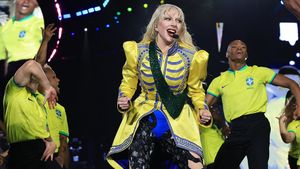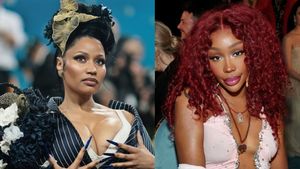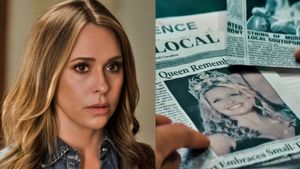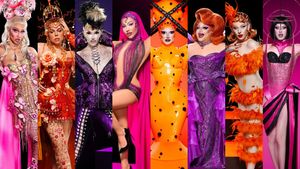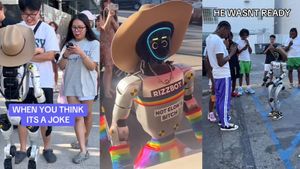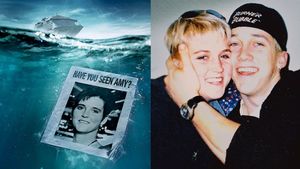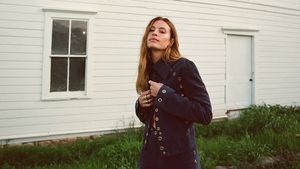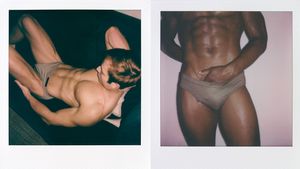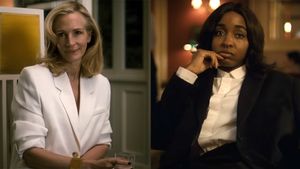If you envision a scene from The Great Gatsby or any other F. Scott Fitzgerald tale of the Jazz Age, it probably would look like a painting by J.C. Leyendecker: a beautiful man in evening clothes dancing with a beautiful woman in a flapper dress, or two beautiful men dressed to play golf or some other sport, with their muscular frames obvious under their expensive clothes.
You may not have heard of Leyendecker, but he was the leading commercial artist of the 1910s and '20s, in demand for high-end advertisements and the covers of popular magazines. He created the dominant aesthetic of the era, and, as a gay man, worked coded homoeroticism into many of his illustrations, offering a lesson that advertisers still found useful at the end of the 20th century.
Now Leyendecker is the subject of a documentary, Coded: The Hidden Love of J.C. Leyendecker, from director Ryan White. It premiered in June at the Tribeca Film Festival in New York, where it won Best Documentary Short, and Thursday it will be featured in the Meet the Press Film Festival of short documentaries, part of AFI Fest in Los Angeles, with both in-person and online screenings.
"I'm not an art history buff, but still I'm ashamed to say I don't think I'd ever heard of J.C. Leyendecker before making this film," White says. "Of course I've heard of Norman Rockwell, but I had no idea Rockwell had a gay mentor. And that was the reason I made the film: Why does American culture revere Rockwell, and yet Leyendecker has been such a footnote? I wanted to know more about him."

Leyendecker was born in Germany and grew up in Chicago, and he studied art in Paris in the early 20th century, encountering Henri de Toulouse-Lautrec and other eminent artists of the time. Upon returning, he soon set up shop in New York City, the center of advertising and publishing.
His models included several men who became famous actors -- John Barrymore, Fredric March, Brian Donlevy -- but one man superseded them all, becoming Leyendecker's primary model and his partner in life as well as work: Charles A. Beach. Beach was the model for the Arrow Collar man, one of the best-known ad icons of the era, and for many of the covers Leyendecker created for The Saturday Evening Post, one of the highest-circulation magazines in the nation.
Leyendecker's artwork found a ready audience. Straight women admired the gorgeous men he depicted, and straight men wanted to emulate them. Gay men responded to his coded messages -- the looks exchanged between men, the awareness of the body under the fashionable clothes. And the hint of homoeroticism came at an appropriate time; while society as large remained homophobic, in the 1920s queer people were finding enclaves where they could be themselves, enjoying an unprecedented degree of freedom.
For a while, Leyendecker knew both fame and fortune. He and Beach shared a mansion in the suburbs of New York, where they gave parties as lavish as those described in Gatsby, and their guests even included Scott and Zelda Fitzgerald. But the Great Depression of the 1930s produced both economic setbacks and increasing conservatism that brought Leyendecker's heyday to an end. Not his relationship with Beach, however -- it endured until Leyendecker's death in 1951, although the artist's obituary acknowledged Beach only as his business associate.
This detail struck a chord with Meet the Press host Chuck Todd, who with his NBC News colleagues will introduce and provide commentary on the films at the festival. Of all the documentaries featured, Coded "is easily my favorite," he says. "It touched me in a way I didn't expect."

Meet the Press host Chuck Todd, courtesy NBC Universal
Todd, a straight ally to the LGBTQ+ community, notes that his family saved an obit of an aunt who died in the 1950s in Iowa. It noted that she shared her home with a fellow teacher -- a woman who was, in reality, her life partner. "Even in death, she had to hide who she was," Todd says. That made him think of how many more relationships, how many more identities, how much more history had been erased. "Every family has an aunt, an uncle, a brother, a sister who hid who they were until the end," he says.
He hadn't heard of Leyendecker before seeing the film, and that was another attraction for him. "My favorite part of doing this festival is learning things I didn't know," he says.
The film uses animation as well as archival photos and interviews with art historians Judy Goffman-Cutler and Jennifer A. Greenhill, ad man John T. Nash, and trans model-actress Jari Jones to detail Leyendecker's life and legacy, and Neil Patrick Harris gives voice to the artist's words. "I found the animation to be a very creative tool," Todd comments.
This is the fifth year for the Meet the Press festival; the films are chosen in a collaborative process between the American Film Institute and the MTP staff. Most of the films are between 20 and 40 minutes long -- Coded is 29 minutes -- a length Todd calls "the sweet spot" for documentaries. The 15 entries are a diverse lot, but all deal with pressing social issues. Bree Wayy: Promise Witness Remembrance, for instance, looks at how artists responded to the death of Breonna Taylor at the hands of police, while Lynching Postcards: "Token of a Great Day" explores the horrifying phenomenon of circulating mementos of the murders of Black Americans.
Coded will be part of a program called "Where I Belong," also featuring Lead Me Home, which tells the stories of people experiencing homelessness; Golden Age Karate, about older people learning self-defense; and The Train Station, the tale of a Native American family. The in-person screening of this program will be Thursday at 8:30 p.m. in theater 4 at the TCL Chinese 6 multiplex in Hollywood. It can be streamed online beginning at noon Pacific time; find details here. Coded will be shown later on MTV and will be available to stream on Paramount+ starting November 22. And Todd will have an interview with White on MTP's streaming program, Meet the Press Reports, available Friday on Peacock.
If Leyendecker were working today, White says, "I think the sky would be the limit. ... But still the breadth of his work that he did accomplish within the confines of the time is astonishing. I think he paved the way for queer storytellers to reflect our own lives in our work. He did it subtly, within the confines of what was socially acceptable at the time, but it was groundbreaking."
See some examples of Leyendecker's art below.









